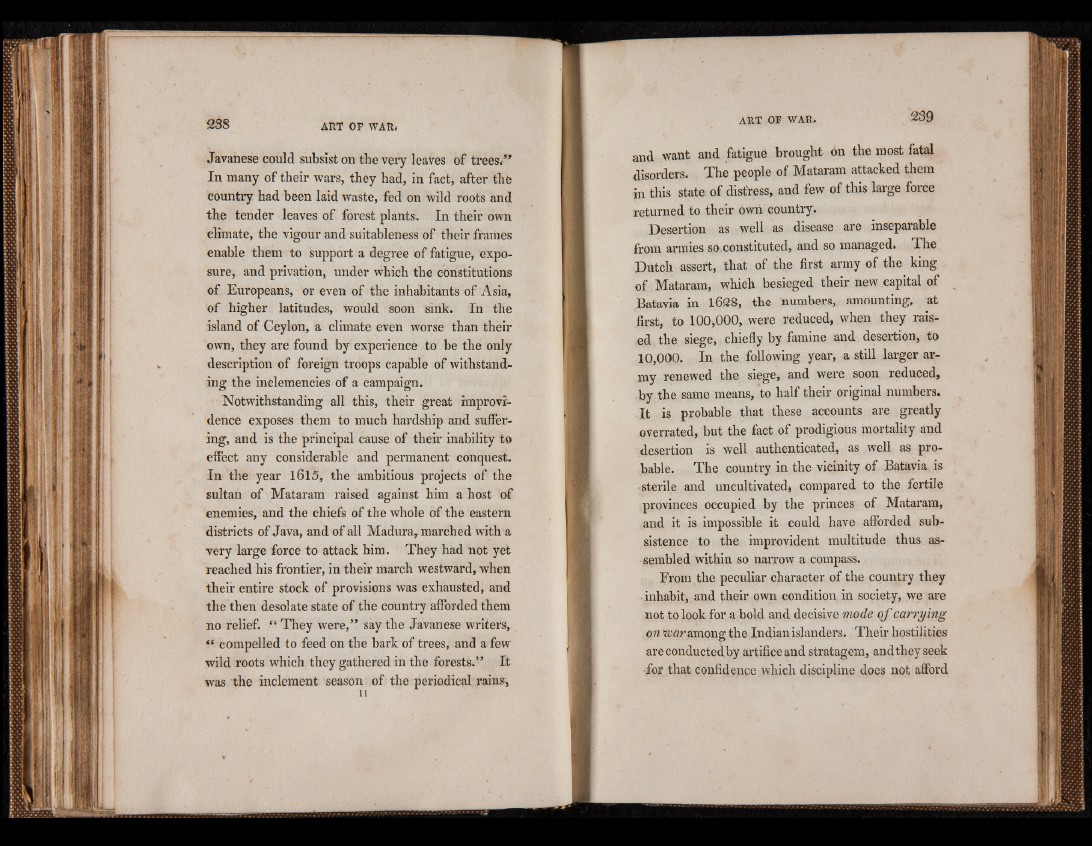
Javanese cotild subsist on the very leaves of trees/’
In many of their wars, they had, in factj after the
country had been laid waste, fed on wild roots and
the tender leaves of forest plants. In their own
climate, the vigour and suitableness of their frames
enable them to support a degree of fatigue, exposure,
and privation, under which the constitutions
of Europeans, or even of the inhabitants of Asia,
of higher latitudes, would soon sink. In the
island of Ceylon, a climate even worse than their
own, they are found by experience to be the only
description of foreign troops capable of withstanding
the inclemencies of a campaign.
Notwithstanding all this, their great improvidence
exposes them to much hardship and suffering,
and is the principal cause of their inability to
effect any considerable and permanent conquest.
In the year 1615, the ambitious projects of the
sultan of Mataram raised against him a host of
enemies, and the chiefs of the whole of the eastern
districts of Java, and of all Madura, marched with a
very large force to attack him. They had not yet
reached his frontier, in their march westward, when
their entire stock of provisions was exhausted, and
the then desolate state of the country afforded them
no relief. “ They were,” say the Javanese writers,
“ compelled to feed on the bark of trees, and a few
wild roots which they gathered in the forests.” It
was the inclement season of the periodical rains,
and want and fatigué brought ón the most fatal
disorders* The people of Mataram attacked them
in this state of distress, and few of this large force
returned to their own country.
Desertion as well as disease are inseparable
from armies so constituted, and so managed. The
Dutch assert, that of the first army of the king
of Mataram, which besieged their new capital of
Batavia in 1628, the numbers, amounting, at
first, to 100,000, were reduced, when they raised
the siege, chiefly by famine and desertion, to
10,000. In the following year, a still larger army
renewed the siege, and were soon reduced,
by the same means, to half their original numbers.
It is probable that these accounts are greatly
overrated, but the fact of prodigious mortality and
desertion is well authenticated, as well as probable.
The country in the vicinity of Batavia is
sterile and uncultivated, compared to the fertile
provinces occupied by the princes of Mataram,
and it is impossible it could have afforded subsistence
to the improvident multitude thus assembled
within so narrow a compass.
From the peculiar character of the country they
inhabit, and their own condition in society, we are
not to look for a bold and decisive mode o f carrying
on war among the Indian islanders. Their hostilities
areconductedby artifice and stratagem, and they seek
Tor that confidence which discipline does not afford